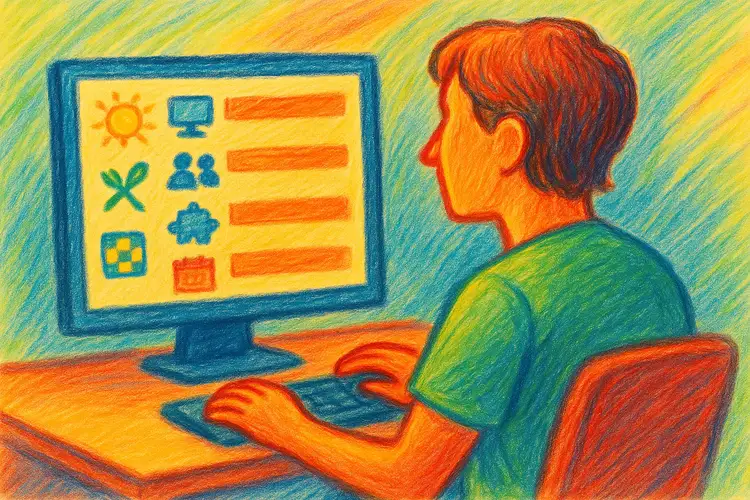Visual Support at Work: Tools that Help Adults with ASD
Published {$created} by Carsten Blum
The workplace can be full of challenges: meetings, deadlines, multitasking, and social expectations. For adults with autism or ADHD, these demands can create stress, overwhelm, or difficulty maintaining focus.
Visual support systems like digital planners, task boards, and pictogram-based reminders make work environments more structured, predictable, and accessible. They help transform complex tasks into clear, manageable steps, allowing individuals to perform at their best.

How Visual Tools Help Adults with ASD or ADHD
Clarity and overview: Tasks and priorities become visible and easy to manage.
Reduced cognitive load: Less need to remember everything verbally or mentally.
Predictability: The day follows a visible plan, reducing anxiety.
Improved focus: Visual cues help maintain attention on what’s next.
Independence: People can manage tasks and time with less external prompting.
When work feels organized and visible, energy can go into performance not just coping.
Examples of Visual Support in the Workplace
📅 Visual schedules and planners
Digital calendars or task boards showing meetings, breaks, and focus blocks.
✅ Step-by-step task lists
Visual breakdowns of recurring processes for example, setting up equipment, completing reports, or closing daily tasks.
🔔 Visual reminders and timers
Color-coded alerts or symbols for upcoming deadlines, breaks, or transitions.
🧭 Workspace organization
Labeled zones, color coding, and icons to identify materials and tools.
💬 Communication aids
Visual charts or icons to support clear communication in teams or during meetings.
How Employers Benefit
Visual systems don’t just support individuals they make entire workplaces run more smoothly.
Clearer workflows: Tasks are visible to all team members.
Better inclusivity: Neurodivergent employees can contribute fully and confidently.
Reduced stress and misunderstandings: Everyone knows what’s next.
Higher productivity: Fewer disruptions and better self-management.
Positive culture: Visual tools promote clarity, empathy, and collaboration.
When structure becomes part of company culture, everyone gains from it.
How to Implement Visual Support at Work
Start small: Begin with one team or role that would benefit most.
Use accessible tools: Digital dashboards, shared planners, or printed boards.
Co-create solutions: Involve neurodivergent employees in designing visuals.
Standardize symbols: Consistency builds recognition across tasks.
Provide training: Make sure everyone knows how and why to use the tools.
Example: Simple Visual Workday Plan
Time | Task | Symbol |
|---|---|---|
08:30 | Check emails and calendar | 💻 |
09:00 | Project work / focus time | 🧩 |
11:00 | Team meeting | 👥 |
12:00 | Lunch break | 🍴 |
13:00 | Continue project tasks | ⚙️ |
15:00 | Documentation | 📝 |
16:00 | Wrap up / plan tomorrow | 📅 |
This structure helps create rhythm and predictability throughout the day.
Long-Term Benefits
For adults with ASD or ADHD, visual support can be a key to long-term success at work:
Greater stability and emotional balance
More consistent productivity
Stronger self-confidence
Improved communication and teamwork
Reduced burnout risk
By turning abstract time and tasks into something visible, visual support helps adults thrive, not just survive, in the workplace.
Summary
Visual tools are powerful equalizers.They make complex workplaces more accessible, inclusive, and calm, giving neurodivergent employees the structure they need to succeed.
Next step: Try introducing a simple visual task board or schedule in your workplace, and see how clarity improves for everyone.